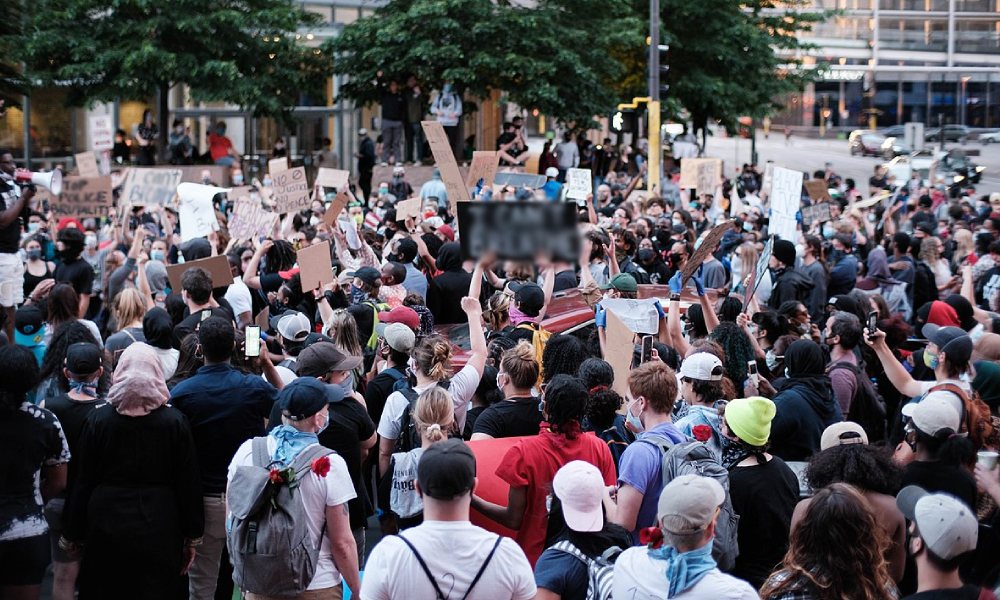
Image Credits: Wikipedia (Representational)
One In Two Indian Americans Claim To Face Discrimination In Past One Year: Report
Writer: Anchal Rana
I am a history enthusiast. I like star-gazing, mountains, reverie and my headspace. Unabashedly an anime lover. I don’t read but write poetry. Books are a relief. Curious to learn the unknown. Prefer the countryside and tea. Above all an aesthete.
Others/World, 10 Jun 2021 7:35 AM GMT
Editor : Ankita Singh |
A literature lover who likes delving deeper into a wide range of societal issues and expresses her opinions about the same. Keeps looking for best-read recommendations while enjoying her coffee and tea.
Creatives : Anchal Rana
I am a history enthusiast. I like star-gazing, mountains, reverie and my headspace. Unabashedly an anime lover. I don’t read but write poetry. Books are a relief. Curious to learn the unknown. Prefer the countryside and tea. Above all an aesthete.
The most often reported kind of bias was discrimination based on skin colour. However, 16% of respondents in the survey indicated their country of origin was a source of prejudice.
Every second member of the Indian-American community in the United States has witnessed prejudice in the previous year, according to a recent poll in a survey.
The Carnegie Endowment for International Peace, Johns Hopkins School of Advanced International Studies, and the University of Pennsylvania collaborated on the project; the survey examined the "social, political, and foreign policy attitudes of Indian Americans".
In the third edition of the 2020 Indian American Attitudes Survey, 31% of respondents say discrimination is a serious problem, while 53% claim it is a minor issue.
Beyond country of origin, the study queried respondents about discrimination based on skin colour, gender, religion, and caste. According to the poll, "the statistics imply that discrimination based on skin colour is the most widespread kind of bias: 30% of respondents report feeling discriminated against because of their skin colour."
An equal percentage of respondents – 18 per cent apiece – report that they have been discriminated against due to their gender or religion."
In collaboration with the research and analytics firm YouGov, it gathered responses from 1,200 Indian Americans between September 1 and September 20, 2020. The results possess a 2.8 per cent error margin, reported Scroll.
"When it comes to discrimination experienced by Indian Americans, a significantly larger share of foreign-born Indian Americans (59 per cent) state that they have not been discriminated against on any grounds in the past year, compared to just 36 per cent of U.S.-born Indian Americans," the survey said.
Sources of discrimination
The most often reported kind of bias was discrimination based on skin colour. However, 16% of respondents indicated their country of origin was a source of prejudice.
Muslims (39%) felt the most discriminated against, followed by Hindus (18%) and Christians (15%) among religious groups.
Almost equally by Indians, non-Indians, or both, 5% of respondents indicated they were discriminated against because of their caste. Because non-Indians may not believe in caste boundaries, caste-based prejudice from that section may include inhabitants from other South Asian nations where it "holds greater salience"," according to the poll.
Almost 75 per cent of perpetrators of discrimination based on country of origin or skin colour were identified as non-Indian. In about one-fifth of incidents, both Indians and non-Indians were reported mutually to be responsible.
Indian Americans, according to a little less than half of the respondents, endure greater prejudice than at least one minority group. However, 52 per cent say that individuals in the United States discriminate against all of the other minority groups listed above more than they do against Indian Americans.
Religious Interplay
Almost three-quarters of those surveyed said religion is very important in their lives.
54 per cent of respondents identified as Hindu, according to the survey. Agnostics, atheists, and those with no religious connection made up the second-largest group, accounting for 16% of the total. Thirteen per cent of respondents said they were Muslim, eleven per cent identified as Christian, and one per cent claimed to be Buddhist.
86 per cent of Hindus associate with some type of "Indian" identity, compared to 71 per cent of Christians and 52 per cent of Muslims. Coupled with the area of origin and caste, religion has an impact on the composition of Indian American social networks.
In comparison to the other two factors, however, the social networks were shown to be more religiously homogeneous.
Both Hindus and Muslims said that having close friends of the same faith is highly comfortable, whereas having close friends of a different faith is less so. Only 52 per cent of Hindus indicated they felt comfortable having close Muslim acquaintances, compared to 46 per cent of Muslims.
Indian Identity
According to the poll, the phrase "Indian American" is not commonly recognised by members of the immigrant community to best characterise their origin, with only 43% choosing it. Twenty-five per cent of all respondents identify as "Indian," with "South Asian Americans" (10 per cent) and "Asian Indians" (10 per cent) following closely behind (7 per cent).
Citizenship Status
The citizenship status of Indian Americans is a major determining factor in their civic and political participation. Citizens born in the United States reported the greatest levels of involvement, followed by citizens born elsewhere in the United States.
Working with others in their community to solve a problem; performing voluntary community service without pay; attending a public meeting, such as for a school board or city council; or attending a protest march, demonstration, or rally – community service was the most popular choice among the four types of civic engagement.
Around 45 per cent of those polled claimed they had engaged in a political debate in the previous year, which is the most prevalent type of political activity. Contributing money to campaigns (14 per cent), contacting an elected representative or government official (12 per cent), and working on a political committee were the next most popular activities on the list (21 per cent).
 All section
All section














